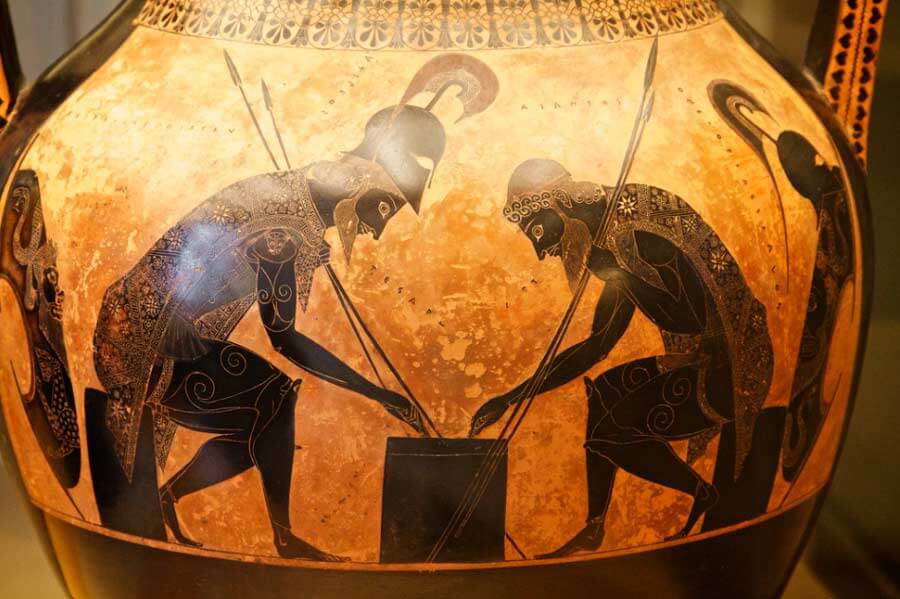
Gods and gambling in ancient Greece
 06. 04. 2022
06. 04. 2022

We will not be far from the truth when we say that gambling is almost as old as humanity itself. Archaeological findings confirm that 40 years ago, our ancestors devoted themselves to the gamewhich resembles today's dice. About 2,5 thousand BC, the game that preceded today's cards was played in China. The fact is that some forms of gambling have existed in virtually the same form for thousands of years. Gambling attracted people of all great ancient civilizations from Rome, through Greece, Egypt, India to the aforementioned China. But have you ever wondered when or how gambling arose?
They were interested in gambling Greeks since ancient times and it seems that we have quickly mastered these bad habits of the past and brought them to perfect perfection. Who would have thought that the origins of poker go back to Minoan civilization (Bronze Age civilization that existed in Crete from about 2700 to 1450 BC)? At present, throwing two sixes in a dice game is considered lucky, and even that has its ancient origins. Thousands of years ago, throwing two sixes was called a “throw Aphrodite" and meant victory in the game.
From the links in Homers and in other ancient texts we can read that gambling was very widespread in ancient Greece. Dice, head and tail games and other "luck" games have always been played by different groups of people. There were even special places where gambling was played. However, like today's casinos, these places had a bad reputation and were considered inappropriate to visit.
People could lose all their fortunes while playing, just as it is today. In ancient Greece, however, players had the support of several gods - Herma a Corduroy . Even the gods are said to have played one or two games. In Greek mythology Zeus, Hades and Poseidon "threw the dice" to divide the universe.
Most of the ancient Greek authors and philosophers she condemned gambling and said that at some point gambling had spread like a plague, resulting in government action to curb these activities. Obviously, whenever and wherever gambling appeared, it was always hand in hand with cheating, not only in antiquity, but it is also true today.
Games about chance and skills
Board game Lady was called "tilia" in ancient Greece and was called the 12-line game in Roman times. Scenes on period frescoes and ceramic pots show that betting on animal fights (including hens, birds and dogs) was also very popular, and these animals were raised for this entertainment.
The game "Heads and Tails" was very popular. She played with shells and later in Roman times with coins, as is the case today. The dice game was a very popular ancient Greek game that used three dice made of clay. Later in the Roman era, only two dice were played, the form as of today.
In ancient Rome, gambling was practiced among slaves and masters, and for some time it was popular among emperors. Gambling has also gained popularity in ancient China, Egypt and Islam. Mentions of gambling can also be found in the Jewish Talmud and Buddhism. In all cases, gambling was regulated for a certain period of time, and in the event of a breach, the player was severely penalized. The "lottery" was a popular gambling practice in ancient Rome, and there is even mention in biblical texts that Roman guards drew lots for Jesus' clothing during his crucifixion.
The card game probably comes from China kenowhich is currently played in modern casinos around the world. It was played with cards numbered from 1 to 80 placed on a square board. The player could circle a set of numbers and then a lottery was held (as in the lottery today) to identify "lucky" numbers. The origin of this game dates back to 2000 years ago and the game was called "white pigeon ticket". The game could only be played in casinos with the permission of the provincial governor, who received a certain percentage of the profits. Until 900 AD, the Chinese invented card games decorated with human figures, which were later spread throughout Europe by the Mameluks (followers of Islam). Later, Europeans began to depict the king and queen on the cards, as we see it today in decks of playing cards.
The dice found, which are estimated to be 40000 years old, and cave paintings depicting players are irrefutable proof that gambling has existed for a very long time. Gambling seems to be our nature.
Eshop

Elizabeth C. Prophet: The Purple Flame in Practice
 12.03.2022
12.03.2022

Marion Giebel: The Secret of Ancient Cults
 12.03.2022
12.03.2022

Wolf- Dieter Storl Medicinal Plants and Hearts
 12.03.2022
12.03.2022





 1
1

